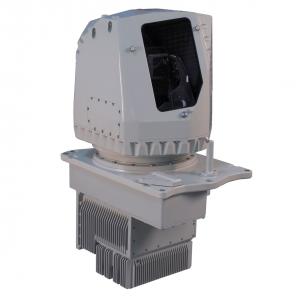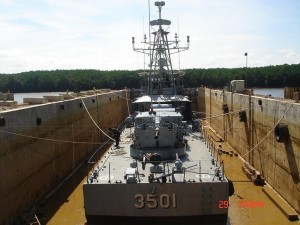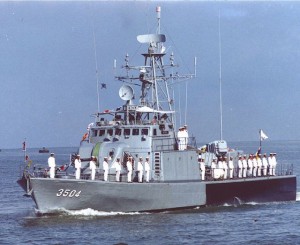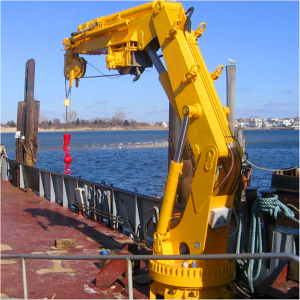SHAH ALAM: IT appears that RMN’s nine FACs – which entered service in the 1970s – are getting new equipment which may allow them to continue service well past 2020. The nine boats are likely those of the Perdana and Jerong classes.
Malaysian Defence had reported previously that nine FACs based in Kuantan and Kota Kinabalu are getting Eletro-Optical Director Systems (EODS) but apart from that they are also getting new navigation radars and single arm knuckle boom cranes.
The tenders for these two items were published in August unlike the EODS which was issued in June. Unfortunately until today, the Defence Ministry has yet to announce the winner of the three tenders for reasons unknown.


Since these boats are armed with guns only, the new EODS should be able to handle most of the tasks during operations including fire control solutions without a dedicated Fire Control Radar (at least for the main guns as the rear ones are likely to be fired manually). It is likely the FCR that came with the boats are obsolete already.


For the Lekiu-class, RMN opted for an Eletro Optical Tracking System (EOTS) though most of the products being marketed today could handle other tasks like fire control as well. Indeed perhaps the same system were offered for both tenders.
As the Lekiu class are equipped with a dedicated FCR, perhaps an EOTS is perhaps a good enough solution. Like the FAC tenders, the winner of the EOTS tender for the Lekiu has also not been officially announced.

While the nine FACs based in Kuantan and Kota Kinabalu are to be fitted the EODS and new navigation radars, only those based in the former will be fitted with the cranes. This cranes could be used to lift anything including RHIBs and other equipment like oil skimming devices.

As mentioned before the FACs to be fitted with the new items are likely to be from the Perdana and Jerong classes. The boats of the Perdana class which entered service around 1973 are KD Perdana, KD Serang, KD Ganas and KD Ganyang. These French built boats were originally fitted with Thomson-CSF air and surface radars, Thomson- CSF Pollux FCR used together with the Vega Optical device and Kelvin Hughes I-band navigation radars.
Since entering service in 1973 until early 2000s, Perdana class main armaments were the MM38 Exocet SSMs but now like the Handalan class boats, they are only armed with guns. In their case its the 57mm and 40mm guns.
Unlike the Perdana and Handalan-class which were armed with missiles and guns, the 45 metre Jerong class were ordered with guns only, 57mm forward and 40mm aft. It was for this reason they had always been designated as gun-armed FACs only.
The Jerong class were built locally at the former Hong Leong Lurssen shipyard in Butterworth in the mid-70s even as the four-Handalan class FACs were ordered. The six-class boats were fitted with the Decca 1226 navigation radar and the Naja Optronic director used with WM28 fire control radar.
The ships of the Jerong class are KD Jerong, KD Todak, KD Paus, KD Yu, KD Baung and KD Pari. The last ship became infamous a few years ago when it sunk as it was preparing to leave its moorings due to a shaft failure. Initially it was thought that the ship will be struck off but it was repaired and returned into service a few months after the incident.
If you have continue reading until this part, you would have noticed that the RMN operates three type of FACs with different equipment since 40 years ago. Yes, even in the 70s, we had spread our arms procurement, far and wide – “the More the Merrier” policy, as shown by the diverse hulls and equipment operated by the RMN.
However two things remained constant, fortunately, the engine and guns, at least for the FAC fleet. The engine of choice for RMN was decidedly German, specifically MTU.
As for the guns, it was Bofors all the way. Both the guns, the 57mm and 40mm remained in service until today unlike the French guns we bought in the 80s (Kasturi and Marikh classes).
— Malaysian Defence
If you like this post, buy me an espresso. Paypal Payment
View Comments (8)
The more the merrier...I like the bangangness ehehehe
There is a total of 10 perdana and jerong boats. The upgrades are only for 9. Any reasons for that?
Reply
No idea thats why I did not mentioned it. I will try to find the reason when I can
Marhalim..how about the spica-M boats are they also to receive the new equipment or are they still operated as FAC -M fitted with exocet MM40 block 3 or just as gun armed FAC.
Reply
The Handalan class are now gun-armed FACs. I dont think the class is being fitted with the new stuff as I recalled seeing a recent tender (cannot recall when) for parts for its fire control equipment.
Shipspotting community rumour: KD Todak (3506) was not seen for a loooong time. Among photo enthusiasts its questioned whether she still exists. Maybe she was beyond repair for some reason and was silently retired. That would explain why only 9 crafts.
For low level conflict (like border patrol or blasting mundus off the map), it would be sufficient. It has longer endurance than and has better armament too.
Using more capable warship simply to deter smuggler or pirates sounds wasteful imo
Actually, the tcombattante n the spica m class of boats should be rearmed wirh missiles . Perhaps the kongsberg may suit them. Missile armed boats are highly effective in the malacca straits n also in and around sabah n sarawak
Still doesn't solve the matter of target acquisition and missile guidance.
The original intent in getting the FACs was to perform a limited sea denial role. Yes they should be armed with SSMs but the RMN wants to ensure that what little cash is available is spent on ships like the Lekiu class rather than high mileage 40 odd year old FACs that can't realistically be operated more than a decade or so due to old age. One can perform as many upgrades as one wants but when the hull wears out, the hull wears out.
That the hulls of FACs can still be operated for a few more years is testimony to those who constructed them and to those who operate and maintain them. All had previously been fitted with DRS300 ESM, new radios, GPS and SATCOM. Many don't realise the a few Vosper PCs are still operated at Sandakan.